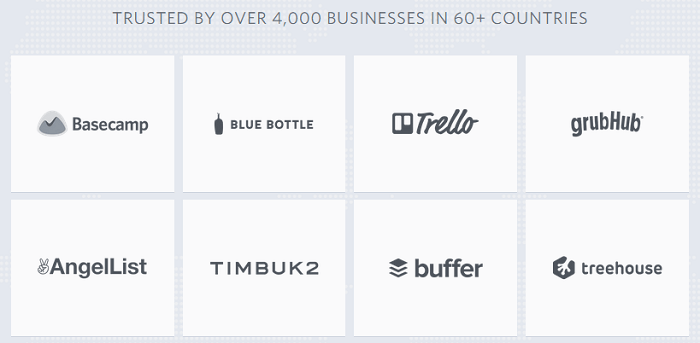-
 7 min. read
7 min. read
-
 Trevin Shirey
Trevin Shirey VP of Marketing
VP of Marketing
- Trevin serves as the VP of Marketing at WebFX. He has worked on over 450 marketing campaigns and has been building websites for over 25 years. His work has been featured by Search Engine Land, USA Today, Fast Company and Inc.
Think about the last time you made a purchase, either online or off. How did you decide which business to patronize? And what factors ultimately convinced you to buy?
If you’re like most consumers, you looked for recommendations from other people.
Maybe you asked a friend if they’d ever been to a certain restaurant, looked for online reviews of a particular product, or visited a company’s social media pages to see how popular they were with their customers.
Regardless of the methods you used, it’s common to look for outside opinions when considering a purchase. As a business owner or marketer, this means that your customers are doing the same.
And as easy as it may be to kick back and let third-party review sites do the work for you, it’s better to take a proactive approach and include social proof right on your site.
What is social proof?
Social proof is the idea that people rely on the feedback and actions of others to make their own decisions. It’s what drives us to consult other consumers instead of going straight to businesses for information, and what causes us to value their opinions more than anything those businesses say.
Your customers do it too.
You can spend hours crafting the perfect product descriptions and calls to action for your website, but ultimately, nothing you write will be as convincing as words from other consumers. Just check out these testimonial examples to see the power of word of mouth.
One of the most powerful forms of social proof is simply word of mouth.
However, considering that you can’t just expect everyone you do business with to go tell their friends and family how great your company is, you need to be a little more creative.
Why is social proof important?
Today’s consumers are constantly bombarded with marketing messages from all kinds of companies, each claiming to be the best at what they do.
This makes it nearly impossible to make an informed decision based on information from companies alone. As a result, over 70% of Americans say they look at product reviews before making a purchase.
Unlike the companies themselves, consumers who review products are typically unbiased.
This means that if they’re willing to vouch for a product’s worth or effectiveness, it’s probably from a good experience instead of a desire to get the company more sales. It also means that the more expensive your products or services are, the more important social proof becomes.
One positive review online may be enough to convince someone to spend $50 on a new pair of shoes, but it likely isn’t enough to convince that same person to spend $5,000 on new software for their company. Medical practices also benefit from proactively asking for reviews as they implement patient marketing to reach new prospects.
Keep that in mind as you weigh your options in the next section, and choose a strategy that matches the cost of your products.
What kinds of social proof can you use?
The most critical thing to consider when including social proof on your site is authenticity.
Consumers want to know that the opinions you convey are truly from other consumers – not your marketing team – so you need to be able to back up your claims with customer data, praise, or both.
Customer data
One of the easiest ways to show site visitors that they can trust your brand is to provide them with concrete data about your current customers.
For example, helpdesk software company Groove does this simply by listing how many customers they have right on their homepage:
This gives their site a dose of credibility right off the bat – after all, if 3,000 customers already trust them, they’re probably doing something right.
To take things a step further, you can provide more details about who your customers are and how you’ve helped them.
For example, if you have a few particularly impressive clients, feel free to name-drop like customer service company Help Scout:
Although 4,000 customers isn’t that much more compelling than Groove’s 3,000, the companies they choose to list make Help Scout much more trustworthy.
If you want to go even more in-depth, you can pull specific statistics from a few of your clients. Business communications company Twilio does this with a section of their site dedicated to brief case studies, like this one from Coca-Cola:
Even if a site visitor’s business has nothing to do with vending machines, the fact that a company as large as Coca-Cola uses Twilio to manage 600,000 of theirs is an impressive feat – one that’s likely to be compelling to those in need of communications software.
Testimonials
Although client statistics allow you to give a big-picture view of your company, nothing compares to reviews from individual customers. If you operate an ecommerce store, pulling a few product reviews may suffice.
If you’re a B2B company, getting reviews takes a little more work – but is even more important.
For example, A/B testing software company Unbounce includes this client testimonial right on their homepage:
Not only did they choose a client who mentioned specific statistics in his review, but they also include a photo, list his credentials, and give visitors the option to watch a full video of his testimonial.
However, your company’s budget may not allow you tape interviews with all of your clients – and that’s okay. While this may be the ideal scenario, you can still see great results with short interviews conducted by phone or email.
Always get permission from your clients before posting their testimonials on your site, and be sure to include a photo. For more information on including testimonials, take a look at these 13 great examples!
Social media metrics
If you have a strong social media presence, or the content on your site tends to do well on various networks, you can leverage this to show site visitors that your content or company is popular with other consumers.
You can do this by including a bar of social media widgets like this one somewhere on your site:
In this case, this bar is located on a blog post and shows the metrics for that particular page. However, if you don’t have a lot of site content (or your site content doesn’t tend to generate lots of likes, tweets, or shares), you can also use them to show how many fans or followers you have on different networks.
That being said, be honest with yourself about your social presence before including these stats on your site. A widget that boasts 5 Facebook fans is less compelling than one that makes no mention of statistics at all.
Ready to start adding social proof to your site?
If you already have customer survey responses on file or an active community of social media followers, adding that information to your site can be a great way to boost conversions almost instantly!
And if you don’t, it’s time to start building your social presence and collecting testimonials.
If you have any questions about how adding social proof to your site, contact us today!
-
 Trevin serves as the VP of Marketing at WebFX. He has worked on over 450 marketing campaigns and has been building websites for over 25 years. His work has been featured by Search Engine Land, USA Today, Fast Company and Inc.
Trevin serves as the VP of Marketing at WebFX. He has worked on over 450 marketing campaigns and has been building websites for over 25 years. His work has been featured by Search Engine Land, USA Today, Fast Company and Inc. -

WebFX is a full-service marketing agency with 1,100+ client reviews and a 4.9-star rating on Clutch! Find out how our expert team and revenue-accelerating tech can drive results for you! Learn more
Try our free Marketing Calculator
Craft a tailored online marketing strategy! Utilize our free Internet marketing calculator for a custom plan based on your location, reach, timeframe, and budget.
Plan Your Marketing Budget

Maximize Your Marketing ROI
Claim your free eBook packed with proven strategies to boost your marketing efforts.
Get the GuideTry our free Marketing Calculator
Craft a tailored online marketing strategy! Utilize our free Internet marketing calculator for a custom plan based on your location, reach, timeframe, and budget.
Plan Your Marketing Budget









